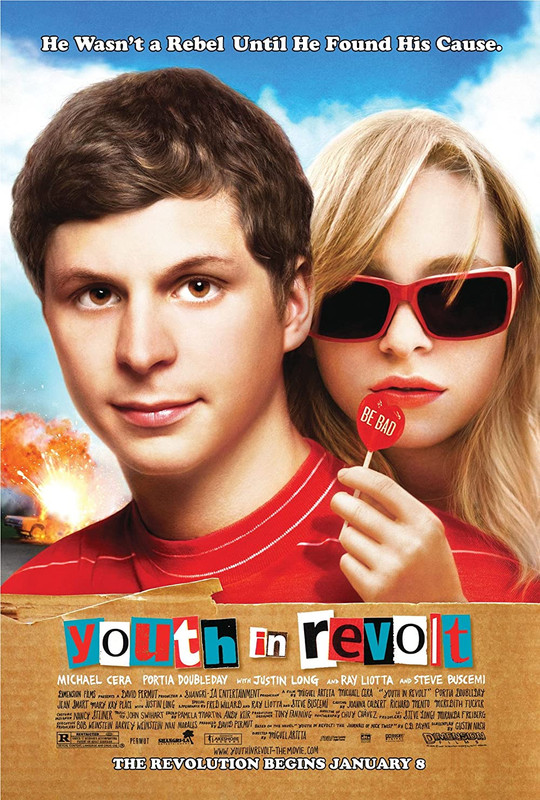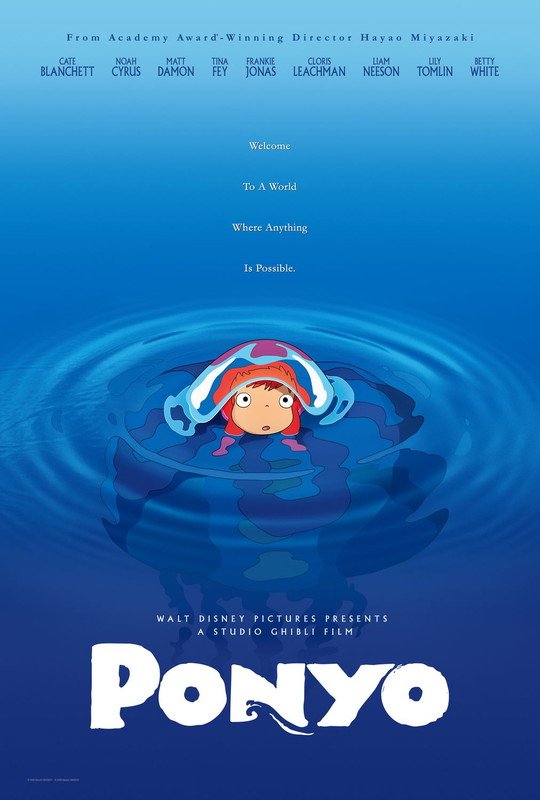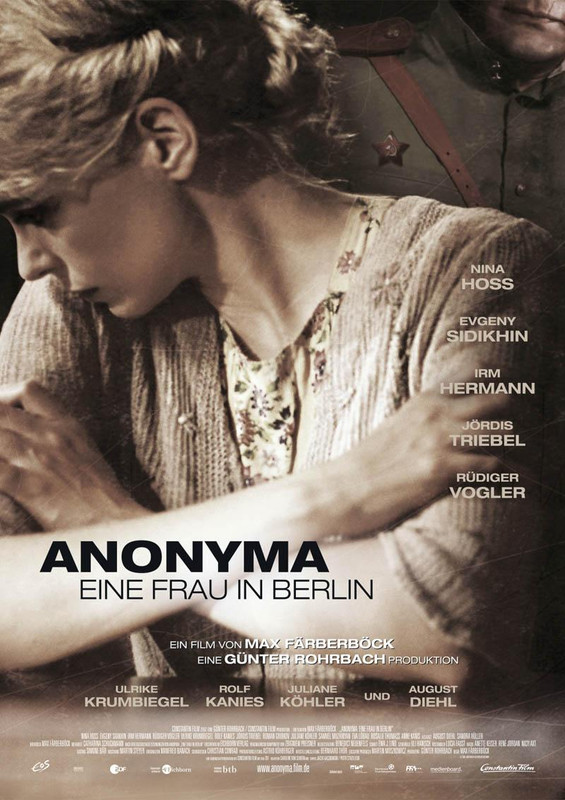Youth in Revolt
Dir: Miguel Arteta
Typecasting, it is sometimes said, is casting. It’s something that a lot of stars embrace because, hey, its work. This certainly seems to be the case with Michael Cera, who first came to notice in the TV show Arrested Development, and seems to have spent his entire, short, film career so far playing the exact same dweeby character. Youth in Revolt, on the surface, seems to offer Cera a chance to stretch his acting muscles a little bit, but in doing so it demonstrates that he has little to stretch.
Cera plays Nick Twisp, a dweeby 16-year-old virgin who lives with his mother (Jean Smart) and a rotating cast of her boyfriends, when the latest boyfriend Jerry (Zach Galifianakis) has to escape some vengeful sailors, who want to beat him up for selling them a faulty car, Nick goes with his mother and Jerry to a campsite where Jerry has a mobile home. While there Nick meets and falls head over heels for Sheeni Saunders (Doubleday), they begin a relationship and when Nick has to leave they hatch a plan involving Nick being bad, so he can get thrown out of his Mother’s house, and come to live nearer Sheeni. To help him do this Nick creates a Jean Paul Belmondo inspired alter-ego; Francois Dillinger.
Playing both sides of this character; the nerdy Nick and the cooler bad boy Francois, should have allowed Cera to prove, at last, that he can do more than be ‘that high pitched kid from Juno’. Instead it achieves the exact opposite effect, Cera appears utterly incapable of doing anything new on screen. In fact, Francois is so unconvincing a character that he undermines the film. He may say a few harsher things than Nick might, but he does it in the exact same uncertain tones as Nick, you’re never really convinced that this rather ineffectual ‘rebel’ would get Nick to do anything more radical than playing something a little more abrasive than Frank Sinatra.
Despite this, and several more problems (such as a screenplay that is very bitty, and provides much dialogue that fails to sound even remotely like words a real person might say), there’s one thing that proves the saving grace of Youth in Revolt, catapulting it over its many weaker elements. It’s funny, consistently, often extremely, funny. The dialogue does much more with the contrast between Nick and Francois than Cera is able to, take this moment when they are trying to seduce Sheeni as an example:
Francois: I'm gonna wrap your legs around my head and wear you like the crown that you are.Nick: If that's OK with you.
There are also a lot of capable comic performances here; Cera, despite having a range that barely stretches beyond arm’s length, is a strong comedian, with great comic instincts and timing and the adult cast match him beat for beat with Galifianakis, Ray Liotta and Fred Willard (who gets several laughs just by lying still), being especially reliable sources of mirth.
The romance between Nick/Francois and Sheeni isn’t brilliantly drawn, largely because, beyond being very pretty, there’s not really much to Sheeni Saunders, and given the attachment that Nick forms to her she really ought to have a bit more personality, it’s not really Portia Doubleday’s fault, she does her best with what she’s got here and is pretty and watchable, it’s just that she’s got rather a thin character. The film is also sometimes hamstrung by the fact that it feels heavily cut. Characters drift in and out of the film at more or less random intervals, leaving the film feeling, at times, more like a series of sketches. I’d usually pick bigger holes in a film with as many problems as this one has, but the fact is, for all its faults, I laughed long, hard and often during Youth in Revolt, and that makes it a rare beast among American comedies at the moment (all the more so since it is seldom reliant on cruelty or gross out jokes for its humour). This is by no means one of the great comedies, but it is a fun way to spend 90 minutes.
★★★
Ponyo
Dir: Hayao Miyazaki
I haven’t really warmed to Hayao Miyazaki’s work, and while I liked this film rather more than the others I’d seen (Princess Mononoke and Spirited Away), there are still things about it that just… rub me the wrong way. It’s worth saying, right up front, that I saw this film in its English dubbed version (something I would only ever do for an animated film).
Ponyo leans quite heavily on what seem to be Miyazaki’s obsessions, namely the relationship of people to their planet and the other creatures living on it. The film tells the story of five year old Sosuke (Jonas), who lives with his Mother Lisa (Fey) on a cliff top house. One day Sosuke finds a goldfish, which he adopts as a pet and names Ponyo (Cyrus). He loses Ponyo by the end of the day, but a bond has formed and Ponyo, after drinking her father’s (Neeson) magical elixir, uses her magic powers to make herself look human, so that she can find Sosuke, an act which causes a raging storm and threatens to throw off the delicate balance of nature.
Ponyo is often a very charming film. Miyazaki’s screenplay captures childhood extremely well, with Sosuke seeming plausible as a five year old, but never becoming irritating in the way that very young kids sometimes can. The fantasy elements of the film are beautifully realised, with Miyazaki creating as magical an undersea world as Disney did in The Little Mermaid; the film that inspired Ponyo in the first place. Kids really ought to love this film, because they’ll get swept up in the world and in the friendship between Ponyo and Sosuke. I found the dub an easy watch, the English dialogue is cleverly written to match the animation and the performances are largely good, with Frankie Jonas a decent lead, Tina Fey making Sosuke’s mother Lisa an interesting and sympathetic character and Cate Blanchett perfectly cast as a goddess of the sea. On the downside, Noah Cyrus voice is high pitched and hard on the ears (it doesn’t help that half of her dialogues is either “Ponyo” or “Sosuke”) and Liam Neeson gives a fine performance, but his voice just doesn’t fit witth his character design at all.
The animation is beautiful, but, and this is something that I’ve felt in all I’ve seen of Miyazaki’s work, I’m just not especially fond of the rather basic, cartoony, drawing style. It’s a matter of personal taste rather than the drawings being bad, but it just doesn’t work for me in the same way that the beautiful work in Satoshi Kon’s films does. The only other major problem with the film for me was that, at times, Miyazaki’s environmental themes resulted in the script turning into an after school special, and talking down to the kids with a lesson, rather than simply telling the story.
All in all, Ponyo is clearly a good film, and Miyazaki clearly a good filmmaker, I just don’t think the director or his films are really for me.
★★½
Anonyma - A Woman in Berlin
Given that Julia Roberts, who to my mind has never been anyone but Julia Roberts on screen, is described as an actress, it seems a little unfair to use the same word to describe what Nina Hoss does. I think we need a new job description here… shapeshifter, changeling, illusionist, possessed. Nina Hoss doesn’t act her characters, she becomes them, she is swallowed whole by them, I’ve got no idea what she’s like in real life and her films, given that she’s so totally different in each of the four I’ve seen her in, appear to hold no clues. I know only this; she is clearly supernaturally gifted.
Anonyma is set right at the end of World War II, in a Berlin just liberated by the red army. It’s based on a book, first published in 1959, and received with such vitriol that the author said it should never be published again until after her death, documenting the almost systematic raping of Berlin women by the Russians. It’s a tough story, told unblinkingly, but never with gratuitous detail, by director Max Farberbock. Instead of the visceral nastiness that could have been part and parcel of telling this story the film focuses on the reaction of Hoss’ nameless character and that of the friends she is haring an apartment with to the way their supposed protectors are now victimising them. The key phrase in the film is "Wie oft?" (how often), which is frequently repeated when the various women in the story meet, almost in the way that one might use any casual greeting, but the meaning behind it, though never stated, is clear and hideous. Among the women in the apartment where much of the film takes place the reactions range from terror, even suicide, to the more mercenary approach taken by Hoss’ character, as she writes in her diary: “I will decide who gets me”.
This is a part of the war that I knew nothing about, and which hasn’t been addressed on film before. It’s an uncomfortable watch in many ways, first because of the subject matter, which is hideous, but also because it doesn’t really work the way a regular war movie works. We are used to having the good guys and the bad guys in a war movie, and the Nazis, by definition, are the bad guys. Here nobody is without a stain on their character. The rank and file members of the red army are generally shown as bored young men, raping women almost as a way to pass the time after the are stopped from storming the Reichstag. The officers (notably Sidikhin as an officer that Hoss latches on to as a way to protect herself) are less violent, but just as corrupt, extracting sex from women in return for protection from their men, and the women themselves are convinced Nazi sympathisers. At some level every person in this movie is worthy of hating, but you do develop sympathy with the women, because what happens to them is so horrifying, and so protracted. It’s brave of Farberbock to take this tack, not to whitewash the women and thus make it easy for us as an audience. He doesn’t give us a panto villain to boo and hiss at, and the film is all the better for it.
The performers all acquit themselves well, with Sidikhin giving a convincing performance in both Russian and English (this is also true of Hoss, who has much Russian dialogue) and the excellent Juliane Kohler appearing like a ray of sunshine in a brief supporting role which leads to probably the nearest thing to a truly light scene in this dark, heavy, picture. Good as everyone is though, they are all acted off the screen by Nina Hoss. This isn’t to say that she’s some hammy scene hog, quite the opposite. Hoss embodies Anonyma’s quiet strength, her fervent resolve, her attempts to retain some measure of her dignity, It’s a performance of great, but often unexpressed, power. Hoss always lets us see what’s going on under the surface in small, subtle ways, ways we don’t believe the other characters would see. It is an extraordinary piece of acting, the only thing connecting it to anything else I’ve seen her do being her unmistakable face; beautiful despite being composed almost exclusively of straight lines and sharp angles.
Max Farberbock creates a believable atmosphere of a war torn Berlin. Everything around the characters is broken, rubble and bodies lie everywhere and even parts of the house in which the characters live are no longer there. The action scenes are few and far between, which is fine, because this film isn’t about the war outside the apartment, but those that are there are brilliantly done; short, sharp and shocking, and filled with exactly the casual brutality you might expect from battle hardened men who were never really supposed to be soldiers. The only real problem with the film is one of its pacing. Anonyma does move slowly, and at 131 minutes it feels rather long at times, and there are some easy cuts to be made to the midsection of the film, which does hammer home the same points several times. The other pacing issue is to do with the timeline, which feels unclear. Apparently the film takes place over barely two weeks, and yet it could well be years from the feel of it.
These, though, are small problems with what is, overwhelmingly, a brilliant film. As with everything I’ve seen her in, Nina Hoss is worth the price of admission for this film all by herself, but she’s far from the only good thing about this difficult, hard hitting, but often stunning film.
★★★★½




No comments:
Post a Comment